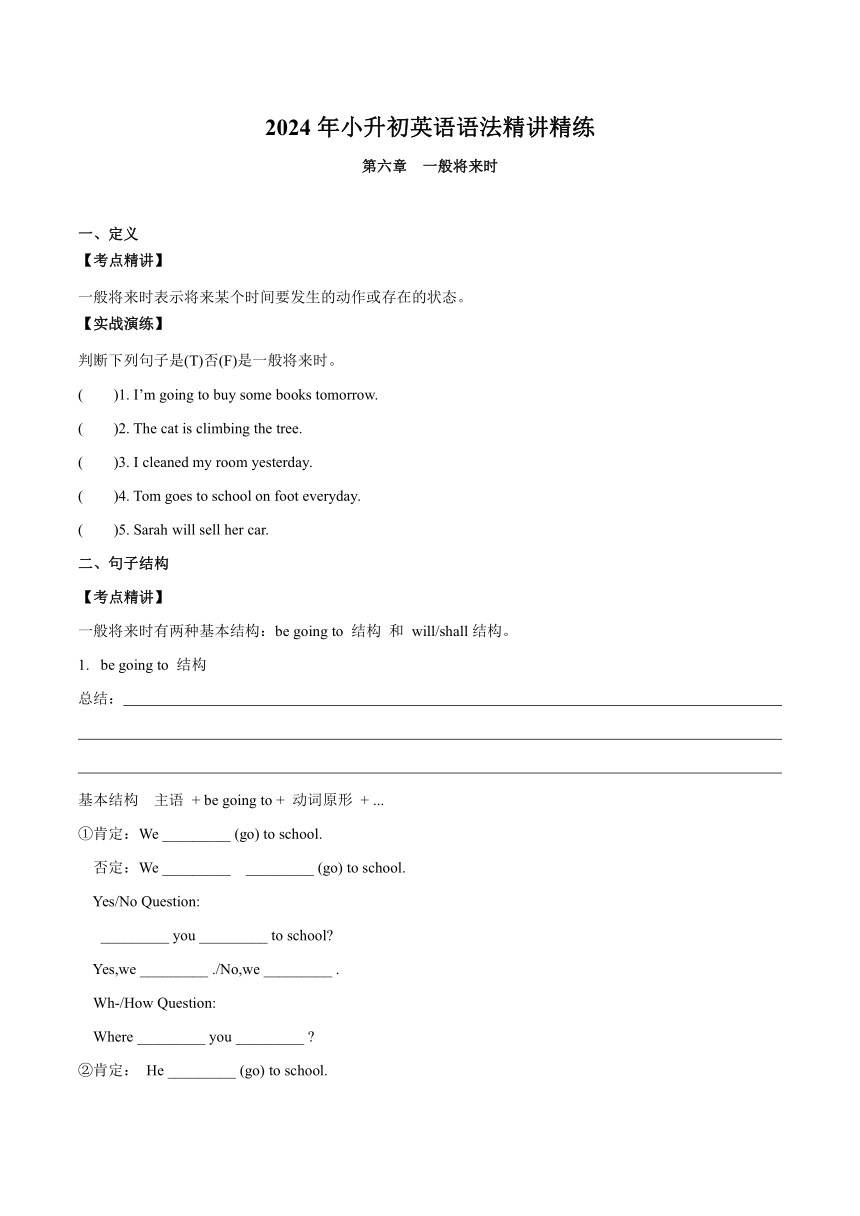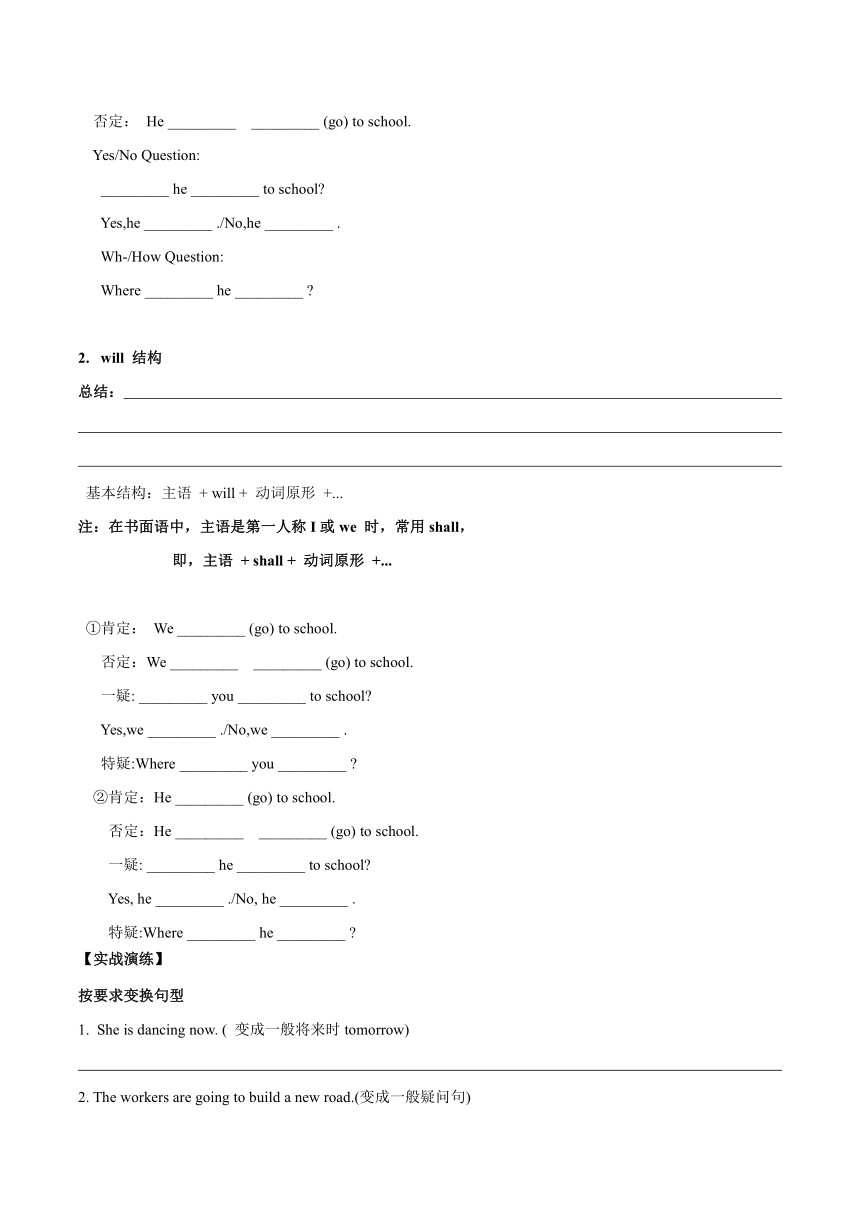人教PEP版英语六年级下册小升初英语语法精讲精练-一般将来时学案(无答案)
文档属性
| 名称 | 人教PEP版英语六年级下册小升初英语语法精讲精练-一般将来时学案(无答案) |  | |
| 格式 | docx | ||
| 文件大小 | 27.8KB | ||
| 资源类型 | 教案 | ||
| 版本资源 | 人教版(PEP) | ||
| 科目 | 英语 | ||
| 更新时间 | 2024-03-04 16:52:48 | ||
图片预览


文档简介
2024年小升初英语语法精讲精练
第六章 一般将来时
定义
【考点精讲】
一般将来时表示将来某个时间要发生的动作或存在的状态。
【实战演练】
判断下列句子是(T)否(F)是一般将来时。
( )1. I’m going to buy some books tomorrow.
( )2. The cat is climbing the tree.
( )3. I cleaned my room yesterday.
( )4. Tom goes to school on foot everyday.
( )5. Sarah will sell her car.
句子结构
【考点精讲】
一般将来时有两种基本结构:be going to 结构 和 will/shall结构。
be going to 结构
总结:
基本结构 主语 + be going to + 动词原形 + ...
①肯定:We _________ (go) to school.
否定:We _________ _________ (go) to school.
Yes/No Question:
_________ you _________ to school
Yes,we _________ ./No,we _________ .
Wh-/How Question:
Where _________ you _________
②肯定: He _________ (go) to school.
否定: He _________ _________ (go) to school.
Yes/No Question:
_________ he _________ to school
Yes,he _________ ./No,he _________ .
Wh-/How Question:
Where _________ he _________
will 结构
总结:
基本结构:主语 + will + 动词原形 +...
注:在书面语中,主语是第一人称I或we 时,常用shall,
即,主语 + shall + 动词原形 +...
①肯定: We _________ (go) to school.
否定:We _________ _________ (go) to school.
一疑: _________ you _________ to school
Yes,we _________ ./No,we _________ .
特疑:Where _________ you _________
②肯定:He _________ (go) to school.
否定:He _________ _________ (go) to school.
一疑: _________ he _________ to school
Yes, he _________ ./No, he _________ .
特疑:Where _________ he _________
【实战演练】
按要求变换句型
She is dancing now. ( 变成一般将来时tomorrow)
2. The workers are going to build a new road.(变成一般疑问句)
3. I do my homework everyday. (变成一般将来时next week)
__________________________________________________________
4. The students will go to the library tomorrow.(变成否定句)
5. My mother will buy a camera for me next week. (就划线部分提问)
现在进行时表示将来时
【考点精讲】
常见的动词有 go ,come, leave, arrive, die 等
如:I’m coming.
The man is dying.
I’m going to school.
【实战演练】
( ) 1. He _________ her a beautiful hat on her next birthday.
A. gives B. gave C. will giving D. is going to give
( ) 2. He _________ to us as soon as he gets there.
A. writes B. has written C. will write D. wrote
( ) 3. He _________ in three days.
A. coming back B. came back
C. will come back D. is going to coming back
( ) 4. If it _________ tomorrow, we’ll go roller-skating.
A. isn’t rain B. won’t rain C. doesn’t rain D. doesn’t fine
( ) 5.— Will his parents go to see the Terra Cotta Warriors tomorrow
— No, _________ (不去).
A. they willn’t B. they won’t C. they aren’t D. they don’t
四、常和一般将来时连用的时间状语
【考点精讲】
tomorrow 明天 before long 不久
the day after tomorrow 后天 Next week(month, year..) 下周
soon 很快 in the future 将来
This afternoon 今天下午 in two days 两天后
this evening 今天晚上 some day 某天
this year 今年
【实战演练】
单项选择
( ) 1. There _________ a meeting tomorrow afternoon.
A.will be going to B. will going to be
C. is going to be D. will go to be
( ) 2. Charlie _________ here next month.
A.isn’t working B. doesn’t working
C. isn’t going to working D. won’t work
( ) 3. He _________ very busy this week, but he _________ free next week.
A. will be; is B. is; is C. will be; will be D. is; will be
( ) 4. There _________ a dolphin show in the zoo tomorrow evening.
A. was B. is going to have
C. will have D. is going to be
( ) 5. — _________ you _________ free tomorrow
— No. I _________ free the day after tomorrow.
A. Are; going to; will B. Are; going to be; will
C. Are; going to; will be D. Are; going to be; will be
五、两种结构的用法与区别
【考点精讲】
总结:
be going to 表示早已决定的,确定的,有预兆的将来动作。
will, shall 则表示临时决定的,不确定的,无预兆的将来动作。
但是如果不清楚是否须先考虑还是未考虑的意图时,二者皆可。
There is somebody at the door. I’ll go and open it.
去开门显然是未经事先考虑的意图,在此,不宜用be going to
– I’m sorry. I forget to mail it tomorrow.
—Never mind. I’ll mail it tomorrow.
Tom 去发这封信不是事先计划好的。
I won’t tell you my age.
我不会告诉你我的年龄。
I’m not going to tell you my age.
我不准备告诉你我的年龄。
He is going to change his job.
我准备换工作。
【实战演练】
用括号中动词的适当形式填空
He _________ ( come ) back in two days..
He _________ (forget) it tomorrow..
At the moment we _________ ( have) classes.
My teacher often _________ ( go) to the library on Sundays.
Look at these clouds. It _________ (rain).
第六章 一般将来时
定义
【考点精讲】
一般将来时表示将来某个时间要发生的动作或存在的状态。
【实战演练】
判断下列句子是(T)否(F)是一般将来时。
( )1. I’m going to buy some books tomorrow.
( )2. The cat is climbing the tree.
( )3. I cleaned my room yesterday.
( )4. Tom goes to school on foot everyday.
( )5. Sarah will sell her car.
句子结构
【考点精讲】
一般将来时有两种基本结构:be going to 结构 和 will/shall结构。
be going to 结构
总结:
基本结构 主语 + be going to + 动词原形 + ...
①肯定:We _________ (go) to school.
否定:We _________ _________ (go) to school.
Yes/No Question:
_________ you _________ to school
Yes,we _________ ./No,we _________ .
Wh-/How Question:
Where _________ you _________
②肯定: He _________ (go) to school.
否定: He _________ _________ (go) to school.
Yes/No Question:
_________ he _________ to school
Yes,he _________ ./No,he _________ .
Wh-/How Question:
Where _________ he _________
will 结构
总结:
基本结构:主语 + will + 动词原形 +...
注:在书面语中,主语是第一人称I或we 时,常用shall,
即,主语 + shall + 动词原形 +...
①肯定: We _________ (go) to school.
否定:We _________ _________ (go) to school.
一疑: _________ you _________ to school
Yes,we _________ ./No,we _________ .
特疑:Where _________ you _________
②肯定:He _________ (go) to school.
否定:He _________ _________ (go) to school.
一疑: _________ he _________ to school
Yes, he _________ ./No, he _________ .
特疑:Where _________ he _________
【实战演练】
按要求变换句型
She is dancing now. ( 变成一般将来时tomorrow)
2. The workers are going to build a new road.(变成一般疑问句)
3. I do my homework everyday. (变成一般将来时next week)
__________________________________________________________
4. The students will go to the library tomorrow.(变成否定句)
5. My mother will buy a camera for me next week. (就划线部分提问)
现在进行时表示将来时
【考点精讲】
常见的动词有 go ,come, leave, arrive, die 等
如:I’m coming.
The man is dying.
I’m going to school.
【实战演练】
( ) 1. He _________ her a beautiful hat on her next birthday.
A. gives B. gave C. will giving D. is going to give
( ) 2. He _________ to us as soon as he gets there.
A. writes B. has written C. will write D. wrote
( ) 3. He _________ in three days.
A. coming back B. came back
C. will come back D. is going to coming back
( ) 4. If it _________ tomorrow, we’ll go roller-skating.
A. isn’t rain B. won’t rain C. doesn’t rain D. doesn’t fine
( ) 5.— Will his parents go to see the Terra Cotta Warriors tomorrow
— No, _________ (不去).
A. they willn’t B. they won’t C. they aren’t D. they don’t
四、常和一般将来时连用的时间状语
【考点精讲】
tomorrow 明天 before long 不久
the day after tomorrow 后天 Next week(month, year..) 下周
soon 很快 in the future 将来
This afternoon 今天下午 in two days 两天后
this evening 今天晚上 some day 某天
this year 今年
【实战演练】
单项选择
( ) 1. There _________ a meeting tomorrow afternoon.
A.will be going to B. will going to be
C. is going to be D. will go to be
( ) 2. Charlie _________ here next month.
A.isn’t working B. doesn’t working
C. isn’t going to working D. won’t work
( ) 3. He _________ very busy this week, but he _________ free next week.
A. will be; is B. is; is C. will be; will be D. is; will be
( ) 4. There _________ a dolphin show in the zoo tomorrow evening.
A. was B. is going to have
C. will have D. is going to be
( ) 5. — _________ you _________ free tomorrow
— No. I _________ free the day after tomorrow.
A. Are; going to; will B. Are; going to be; will
C. Are; going to; will be D. Are; going to be; will be
五、两种结构的用法与区别
【考点精讲】
总结:
be going to 表示早已决定的,确定的,有预兆的将来动作。
will, shall 则表示临时决定的,不确定的,无预兆的将来动作。
但是如果不清楚是否须先考虑还是未考虑的意图时,二者皆可。
There is somebody at the door. I’ll go and open it.
去开门显然是未经事先考虑的意图,在此,不宜用be going to
– I’m sorry. I forget to mail it tomorrow.
—Never mind. I’ll mail it tomorrow.
Tom 去发这封信不是事先计划好的。
I won’t tell you my age.
我不会告诉你我的年龄。
I’m not going to tell you my age.
我不准备告诉你我的年龄。
He is going to change his job.
我准备换工作。
【实战演练】
用括号中动词的适当形式填空
He _________ ( come ) back in two days..
He _________ (forget) it tomorrow..
At the moment we _________ ( have) classes.
My teacher often _________ ( go) to the library on Sundays.
Look at these clouds. It _________ (rain).
